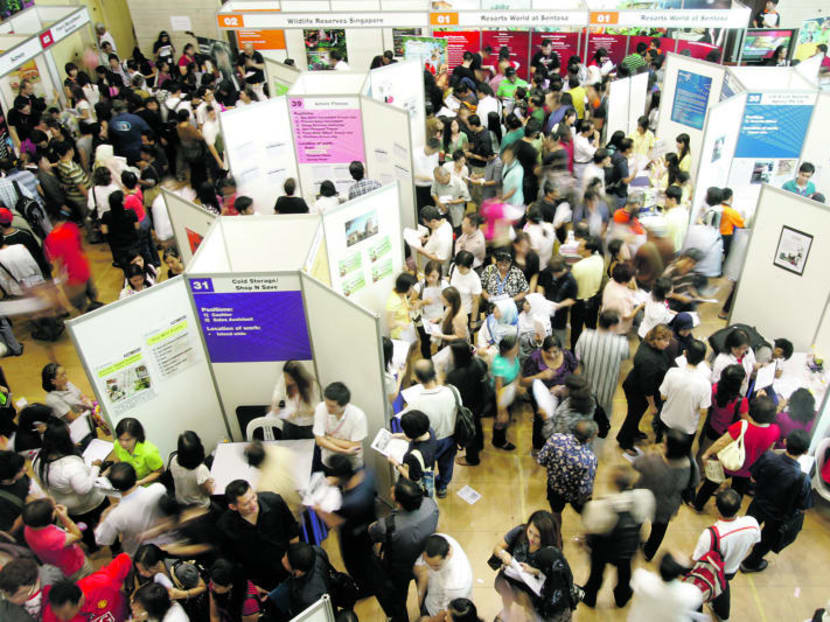Govt will be more flexible with help for needy S’poreans
SINGAPORE — Amid a slowing economy and mounting concerns over the jobs situation, the Government is prepared to provide financial assistance to the needy — including families whose breadwinners have lost their jobs — over a longer-than-usual period, and exercise more flexibility in assessing potential cases, said Social and Family Development Minister Tan Chuan-Jin.

Job seekers attend a service industry job fair organised by North West Community Development Council. TODAY file photo
SINGAPORE — Amid a slowing economy and mounting concerns over the jobs situation, the Government is prepared to provide financial assistance to the needy — including families whose breadwinners have lost their jobs — over a longer-than-usual period, and exercise more flexibility in assessing potential cases, said Social and Family Development Minister Tan Chuan-Jin.
His ministry is also looking to strengthen collaboration and information-sharing among the voluntary welfare organisations (VWOs) and community stakeholders to ensure affected individuals and households receive help promptly, he added.
Speaking to TODAY in a wide-ranging interview last week, Mr Tan underlined the need to provide assurance to Singaporeans during this “fairly uncertain period”, which he believes will continue for some time.
Nevertheless, he reiterated that the Singapore economy is well-positioned to ride it out. “We aren’t actually in a very bad shape ... we are in a strong position and that’s important, because what it means is that what we’ve been doing, what we are trying to do is still keeping the economy on track in terms of generating jobs and opportunities,” he said.
While the number of layoffs is creeping up, the unemployment rate remains low, by international standards. Based on latest official data, the unemployment rate for Singapore citizens in September last year was 3 per cent, while the overall rate was 2.1 per cent.
Yet Mr Tan is keenly aware that for individuals whose livelihoods are affected, the macro picture is scant comfort.
“I’m always very mindful, certainly from my time in the Ministry of Manpower, that (there) is no point telling the unemployed, ‘actually your economy is quite good, only 3.1 per cent unemployment (rate in June last year)’,” said Mr Tan, who helmed the manpower ministry from 2012 to 2015, before being appointed to his current post.
“Because if I’m unemployed, it’s 100 per cent (unemployment for the affected individual), so that’s no consolation to me.”
Apart from retraining and matching affected workers to new jobs, the Government also provides support in the form of the ComCare scheme, a social safety net for low-income Singaporeans. It offers assistance to help individuals meet their immediate needs or tide over difficult periods, as well as over the long-term for those who are permanently unable to work.
Should the economic situation turn for the worse, the Government stands ready to help — just as it did during the 2009 global financial crisis, Mr Tan stressed.
“I’m quite aware that as the situation perhaps becomes more uncertain … we are prepared to look at various cases even though it may not quite meet our criterion today,” he said. This means getting Ministry of Social and Family Development officers to exercise “flexibility and latitude” when assessing borderline cases and extending periods of assistance, he added.
“If the labour market continues to stagnate, we can expect to see more households such as those whose breadwinners were retrenched applying for ComCare if they cannot cope,” he said.
“We are prepared to exercise greater flexibility in providing ComCare assistance to help households. For instance, if a retrenched worker requires more time to find a job — as a result of limited jobs for his or her skillset in the labour market — our Social Service Office (SSO) officers are prepared to consider providing the household with a longer duration of assistance.”
In fact, Mr Tan wants his officers to spend more effort analysing cases at the margins to see how best to assist them.
A full network of 24 SSOs has been set up across the island to make help more accessible, while processes have also been made less onerous. Other initiatives include the Social Service Net, an information-sharing and case-management system that links the ministry with other government agencies and voluntary welfare organisations.
A firm believer of reaching out to those in need as early as possible before their situations become worse, Mr Tan noted that “turf issues” among the VWOs or other parties could crop up at times if relationships are not established. Government agencies, VWOs and other stakeholders cannot operate independently; they need to communicate with one another and proactively step forward to provide assistance, he said.
Over the years, the Government has shed its aversion to state welfarism — rolling out a raft of initiatives to help the needy. Even so, the principles of self-reliance and family support remain sacrosanct.
“You need to be very careful because when individuals don’t see a need ... to depend on themselves, (they will) feel that it’s much easier to not work and get all these handouts,” Mr Tan said.
He also cautioned against veering towards a direction where children neglect their parents because they think the State and the community will step in. “As a society, (we) also need to realise that families do need to take responsibility,” he added.






